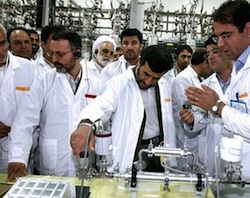Clinton Says the U.S. Remains Open to Negotiations on Iranian Nuclear Program, but is Examining Next Steps on Sanctions
January 5, 2010
Featured Image
We are happy to serve you a daily summary of the day's top nuclear policy stories each morning, with excerpts from the stories in bullet form.
Stories we're following today:
U.S. Says Door Still Open on Iranian Nuclear Issue - AFP [link]
- The United States said Monday "the door is still open" for Iran to meet world demands on its nuclear aims, but warned it was discussing with allies the "next steps" which could include sanctions.
- Separately, Secretary of State Hillary Clinton said the United States has discussed with its allies "pressure and sanctions" on Iran over its nuclear program, which the West suspects is a cover for atomic weapons-building.
- "Our goal is to pressure the Iranian government, particularly the Revolutionary Guard elements without contributing to the suffering of ordinary (Iranians) who deserve better than what they are currently receiving" she said.
The 2010 Nuclear Security Agenda - Joe Cirincione on KPFK Pacifica Radio in Los Angeles [link]
- Note: Fast forward to 2:46 to listen to Joe's interview with Ian Masters
Four Global Crisis Spots - Michael O'Hanlon in the Washington Times [link]
- Finally, 2010 is the year when the U.S. Senate may consider ratification of the Comprehensive Test Ban Treaty (CTBT) on nuclear weapons, signed under Bill Clinton but previously rejected by the Senate during his administration.
- Since then, our nuclear arsenal has held up even better than expected, more alternatives to nuclear testing to preserve confidence in the arsenal have been devised, and verification methods have been honed (allowing us for example to detect North Korea's sub-kiloton test of 2006).
- The case for ratification is strong. If it occurs here, that will be a good boost in the arm for the broader international effort to delegitimize nuclear weapons - not necessarily stopping Iran from getting the bomb, alas, but making it easier to pressure Tehran as well as leaders in Pyongyang if they move in provocative nuclear directions.
This Just In: James Cameron's Post-'Avatar' Plans - The Washington Post Reliable Source [link]
- Last month, "Avatar" director James Cameron traveled to Japan to research a possible film on nuclear weapons.
- Our Tokyo-based colleague Blaine Harden reports that on Dec. 22, the Oscar winner visited Tsutomu Yamaguchi, an ailing 93-year-old man who survived the U.S. bombings of Nagasaki and Hiroshima. (Yamaguchi was traveling on business in Hiroshima when the first A-bomb exploded on Aug. 6, 1945, leaving him with serious burns, blasted eardrums and temporary blindness; after he returned home to Nagasaki three days later, the second A-bomb destroyed that city.)
- The director told a Japanese paper he's not certain he'll make a nukes-themed film -- but if he did, it would be "uncompromising."
A View from the Dark Side
A False Nuclear START - Wall Street Journal Editorial [link]
- The Obama Administration continues to negotiate with the Russians over a new Strategic Arms Reduction Treaty (Start), but one big question is whether it can get the result through the U.S. Senate. A group of Senators is telling the White House that it will have little or no chance of success unless it also moves ahead with nuclear-warhead modernization.
- Mr. Obama would be wise to take the warning seriously because he'll need 67 Senate votes to approve any arms-control treaty. Without modernization, it's unlikely that Senators will vote for the significant and probably unwise reductions in U.S. nuclear delivery vehicles that Mr. Obama is negotiating with the Russians.
- The stakes here aren't merely whether Mr. Obama can get his treaties ratified; they concern the credibility of the U.S. nuclear umbrella. Mr. Obama says he wants to stop nuclear proliferation but he will only encourage it if our allies begin to believe that the U.S. arsenal is either too small or too unreliable to protect them.



